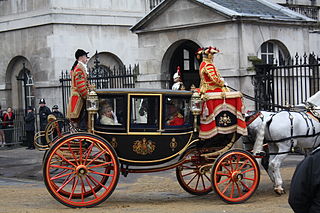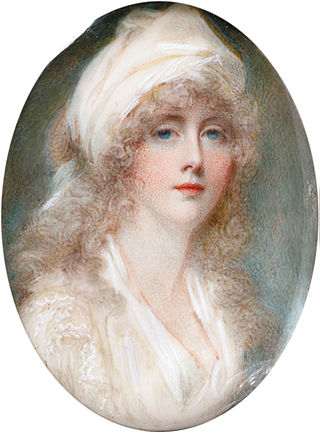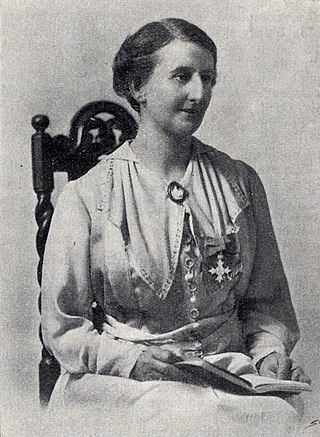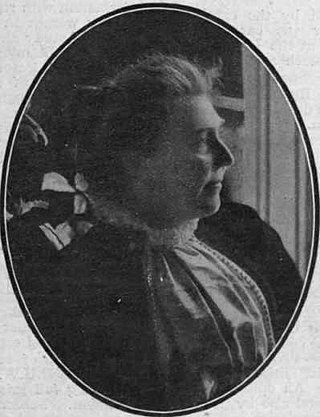
The Souls was a small loosely-knit but distinctive elite social and intellectual group in the United Kingdom from 1885 to the turn of the century. Many of the most distinguished British politicians and intellectuals of the time were members. The original group of Souls reached its zenith in the early 1890s and had faded out as a coherent clique by 1900.

Gerald William Balfour, 2nd Earl of Balfour, PC, known as Gerald Balfour or The Rt Hon. G. W. Balfour until 1930, was a senior British Conservative politician who became a peer on the death of his brother, former prime minister Arthur Balfour, in 1930.

Lady of the Bedchamber is the title of a lady-in-waiting holding the official position of personal attendant on a British queen regnant or queen consort. The position is traditionally held by the wife of a peer. A lady of the bedchamber would give instructions to the women of the bedchamber on what their queen wished them to do, or may carry out those duties herself.
Sir John Dudley Robert Tarleton Tilney, was a British Conservative politician. He was Member of Parliament (MP) for Liverpool Wavertree from 1950 until his retirement at the February 1974 general election. He was Under-Secretary of State for Commonwealth Relations from 1962 to 1964.

Dame Edith Sophy Lyttelton was a British novelist, playwright, World War I-era activist and spiritualist.

The Women's Engineering Society is a United Kingdom professional learned society and networking body for women engineers, scientists and technologists. It was the first professional body set up for women working in all areas of engineering, predating the Society of Women Engineers by around 30 years.

Louise Hume Creighton was a British author of books on historical and sociopolitical topics, and an activist for a greater representation of women in society, including women's suffrage, and in the Church of England.

Lady Frances Balfour was a British aristocrat, author, and suffragist. She was one of the highest-ranking members of the British aristocracy to assume a leadership role in the Women's suffrage campaign in the United Kingdom. Balfour was a member of the executive committee of the National Society for Women's Suffrage from 1896 to 1919. As a non-violent suffragist, she was opposed to the militant actions of the Women's Social and Political Union, whose members were called the suffragettes.

Anne Mee, née Foldsone (1765–1851) was a prolific English miniature painter of the late 18th and early 19th centuries.

Wilhelmina Hay Abbott, also known by the name "Elizabeth Abbott," was a Scottish suffragist, editor, and feminist lecturer, and wife of author George Frederick Abbott.

English Female Artists, in two volumes, assembled and edited by Ellen Creathorne Clayton, lists an overview of prominent English women painters up to 1876, the year of publication.

Laura Annie Willson MBE was an English engineer and suffragette, who was twice imprisoned for her political activities. She was one of the founding members of the Women's Engineering Society and was the first female member of the Federation of House Builders.

Lady Laura Elizabeth Ridding born was a British biographer, suffragist and philanthropist.

Mary Kathleen Lyttelton was a British activist, editor and writer. She devoted much of her life to fighting for women's suffrage and for the improvement of women's lives in general.

The Ladies Dining Society was a private women's dining and discussion club, based at Cambridge University. It was founded in 1890 by the author Louise Creighton and the women's activist Kathleen Lyttelton. Its members, most of whom were married to Cambridge academics, were believers in women’s education and were active in the campaign to grant women Cambridge degrees. Most were strong supporters of female suffrage.
The Electrical Association for Women (EAW) was a feminist and educational organisation founded in Great Britain in 1924 to promote the benefits of electricity in the home.

Constance Flower, Baroness Battersea, also known as Lady Battersea, was a society hostess and philanthropist in London who established the Jewish Association for the Protection of Girls, Women and Children in 1885 and was prominent in the Temperance movement in the United Kingdom.
Elizabeth Wilhelmina Ness, who wrote as Mrs Patrick Ness or E. Wilhelmina Ness (1881-1962) was an English traveller. She was the first female Fellow of the Royal Geographical Society (RGS), and the first woman to be elected to the RGS Council. In 1953 she endowed an annual award to encourage travel, the Ness Award.

Elizabeth Edith Balfour, Countess of Balfour was a British suffragette, politician, and writer. A staunch Conservative, she served as Dame President of the Woking Habitation of the Primrose League and was a founding member of the Conservative and Unionist Women's Franchise Association, serving as president of the association's chapter in Edinburgh. After the 1910 Conciliation Bill failed to pass in the House of Commons, she went on a speaking tour across the United Kingdom to rally support for women's suffrage. In 1919, Lady Balfour became the first woman to sit on the Woking Borough Council.















